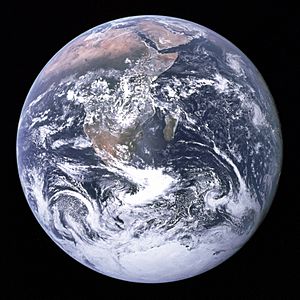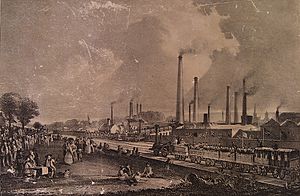Environmentalism facts for kids

Environmentalism is a way of thinking and a big group effort focused on protecting our planet. It's about keeping nature safe and healthy for everyone. Environmentalists work to save, protect, and fix the natural world from harm. They often talk about dangers to Earth, like pollution and too many people (called overpopulation).
Environmentalism can be personal or political. Personally, environmentalists do things in their daily lives that help the Earth. This includes recycling, using natural products, and supporting businesses that are kind to the environment. Politically, they support laws that protect nature, such as rules against pollution.
Contents
What Does "Environmentalism" Mean?
The word Environmentalism comes from two parts: 'environmental' and '-ism'. 'Environmental' refers to everything around us, like the air, water, and living things. The '-ism' part means a belief or a movement. So, environmentalism is a movement or belief focused on our environment.
Why is Protecting Our Planet Important?
Protecting the environment is super important because it affects everything. A healthy planet gives us clean air to breathe and clean water to drink. It also provides homes for animals and plants. When the environment is damaged, it can harm people, animals, and the whole planet.
How Pollution Harms the Earth
Pollution happens when harmful things get into our air, water, or land. For example, smoke from factories can make the air dirty. Trash thrown into rivers can harm fish. Pollution can make people sick and destroy natural places.
The Challenge of Overpopulation
Overpopulation means there are too many people living in one area. When there are too many people, we use more resources like water and food. We also create more waste and pollution. This puts a lot of stress on the Earth's natural systems.
How Can We Help the Environment?
There are many ways to be an environmentalist, both big and small. Every little bit helps!
Everyday Actions for a Healthier Planet
You can help the environment in your daily life.
- Recycle: Put your plastic, paper, and glass in recycling bins. This saves resources and reduces waste.
- Save Energy: Turn off lights when you leave a room. Unplug chargers when not in use.
- Save Water: Take shorter showers. Turn off the tap while brushing your teeth.
- Walk or Bike: If you can, walk or ride your bike instead of driving. This reduces air pollution.
- Support Green Businesses: Choose companies that try to protect the environment.
Working for Environmental Change
Many people work together to make bigger changes. They might join groups that clean up parks or beaches. They might also ask their leaders to pass laws that protect nature. For example, laws can stop factories from polluting or protect special natural areas.

The idea of protecting the environment isn't new. During the Industrial Revolution, factories caused a lot of pollution. This led to some of the first laws to control pollution in the 1800s. Thinkers like John Ruskin and Henry David Thoreau also wrote about the beauty of nature and the importance of protecting it a long time ago.
Images for kids
-
Levels of air pollution rose during the Industrial Revolution, sparking the first modern environmental laws to be passed in the mid-19th century.
-
John Ruskin, an influential thinker who articulated the Romantic ideal of environmental protection and conservation
-
Original title page of Walden by Henry David Thoreau
-
In the United States and several other countries, the boom was manifested in suburban development and urban sprawl, aided by automobile ownership.
-
Before flue-gas desulfurization was installed, the air-polluting emissions from this power plant in New Mexico contained excessive amounts of sulfur dioxide.
-
Reef doctor work station in Ifaty, Madagascar
-
Climate activists blockade British Airports Authority's headquarters for day of action.
See also
- Car-free movement
- Ecology
- Simple living
- Sustainability
- Greta Thunberg
- Voluntary Human Extinction Movement
 In Spanish: Ecologismo para niños
In Spanish: Ecologismo para niños












